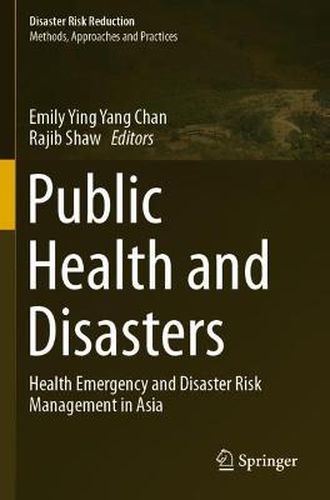Readings Newsletter
Become a Readings Member to make your shopping experience even easier.
Sign in or sign up for free!
You’re not far away from qualifying for FREE standard shipping within Australia
You’ve qualified for FREE standard shipping within Australia
The cart is loading…






This title is printed to order. This book may have been self-published. If so, we cannot guarantee the quality of the content. In the main most books will have gone through the editing process however some may not. We therefore suggest that you be aware of this before ordering this book. If in doubt check either the author or publisher’s details as we are unable to accept any returns unless they are faulty. Please contact us if you have any questions.
This book presents the health emergency and disaster risk management (H-EDRM) research landscape, with examples from Asia. In recent years, the intersection of health and disaster risk reduction (DRR) has emerged as an important interdisciplinary field. In several landmark UN agreements adopted in 2015-2016, including the Sendai Framework for Disaster Risk Reduction 2015-2030, the 2030 Sustainable Development Goals (SDGs), the Paris climate agreement, and the New Urban Agenda (Habitat III), health is acknowledged as an inevitable outcome and a natural goal of disaster risk reduction, and the cross-over of the two fields is essential for the successful implementation of the Sendai Framework. H-EDRM has emerged as an umbrella field that encompasses emergency and disaster medicine, DRR, humanitarian response, community health resilience, and health system resilience. However, this fragmented, nascent field has yet to be developed into a coherent discipline. Key challenges include redundant research, lack of a strategic research agenda, limited development of multisectoral and interdisciplinary approaches, deficiencies in the science-policy-practice nexus, absence of standardized terminology, and insufficient coordination among stakeholders. This book provides a timely and invaluable resource for undergraduate and postgraduate students, researchers, scholars, and frontline practitioners as well as policymakers from across the component domains of H-EDRM.
$9.00 standard shipping within Australia
FREE standard shipping within Australia for orders over $100.00
Express & International shipping calculated at checkout
This title is printed to order. This book may have been self-published. If so, we cannot guarantee the quality of the content. In the main most books will have gone through the editing process however some may not. We therefore suggest that you be aware of this before ordering this book. If in doubt check either the author or publisher’s details as we are unable to accept any returns unless they are faulty. Please contact us if you have any questions.
This book presents the health emergency and disaster risk management (H-EDRM) research landscape, with examples from Asia. In recent years, the intersection of health and disaster risk reduction (DRR) has emerged as an important interdisciplinary field. In several landmark UN agreements adopted in 2015-2016, including the Sendai Framework for Disaster Risk Reduction 2015-2030, the 2030 Sustainable Development Goals (SDGs), the Paris climate agreement, and the New Urban Agenda (Habitat III), health is acknowledged as an inevitable outcome and a natural goal of disaster risk reduction, and the cross-over of the two fields is essential for the successful implementation of the Sendai Framework. H-EDRM has emerged as an umbrella field that encompasses emergency and disaster medicine, DRR, humanitarian response, community health resilience, and health system resilience. However, this fragmented, nascent field has yet to be developed into a coherent discipline. Key challenges include redundant research, lack of a strategic research agenda, limited development of multisectoral and interdisciplinary approaches, deficiencies in the science-policy-practice nexus, absence of standardized terminology, and insufficient coordination among stakeholders. This book provides a timely and invaluable resource for undergraduate and postgraduate students, researchers, scholars, and frontline practitioners as well as policymakers from across the component domains of H-EDRM.